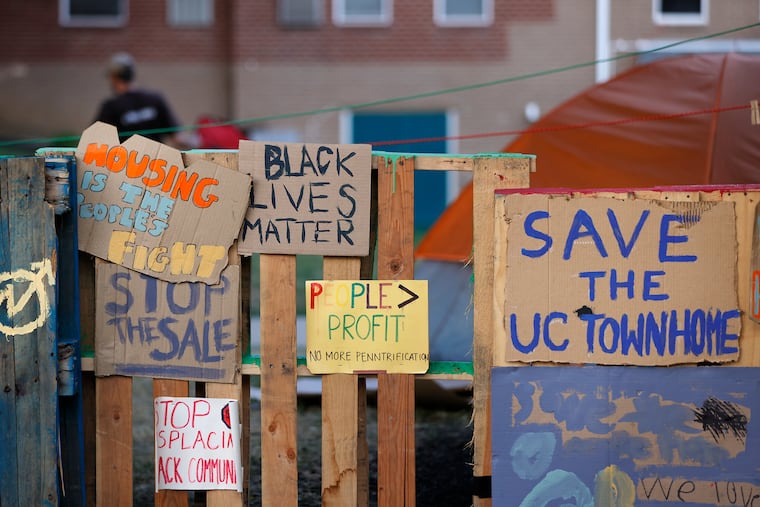Fixing the affordable housing crisis must start with addressing poverty
The truth is that our problem is not just housing. It’s everything else that’s connected to it.

The University City Townhomes debacle is a microcosm of much of what ails Philadelphia — ours is a city where we compartmentalize crises while pretending there’s no connection between them.
Seventy families will be displaced when the property’s owner, IBID Associates, sells the housing complex located at 40th and Market. Those families will be moved from safe, clean, and affordable lodging that has sheltered families of meager means for 40 years. Now the property value has skyrocketed, and the owners want to cash in. While the residents will be hurt by the decision, and their protests are painful to watch, the owners have every right to sell the property. Pretending otherwise just prolongs the inevitable.
But that doesn’t mean there’s no solution. It simply places Philadelphia in the unenviable position of having to face the truth. And the truth is that our problem is not just housing. It’s everything else that’s connected to it.
We don’t have enough affordable housing in Philadelphia, not only because rents are unreasonably high, but because too many of our citizens couldn’t afford it even if the rates were lowered. A quarter of Philadelphians live in poverty. Like all of our myriad issues, the poverty does not exist in isolation.
» READ MORE: Amid Philly’s crisis of affordable housing, a ‘perfect storm’ is brewing | Opinion
We have impoverished citizens because our educational system is underfunded, and the best jobs go to the well-educated. Our educational system is underfunded because Pennsylvania does not fairly compensate school districts with an abundance of poor people. Such school districts don’t get their fair share of funding because they lack the power to hold policymakers accountable.
Take a thick black Sharpie and underline the whole sorry mess with the constant scourge of racism, and you’ll come to understand the bottom line. The people who are protesting in University City to stay in housing they don’t own will probably not prevail. That’s sad, it’s unfair, but it’s true. The city knows that. Now, what are we willing to do about it?
The University City Townhomes residents have been offered housing vouchers from the Philadelphia Housing Authority. That’s a fine gesture, but for those who live in a community bolstered by the presence of universities such as Penn and Drexel, a voucher to live in a neighborhood that’s likely to be impoverished is not a reward. It is a punishment.
Therefore, if we truly want to solve the affordable housing issue, we must stop our collective hand-wringing and turn to the resources that the citizens collectively own.
» READ MORE: Black Philadelphians must fight segregation with economic empowerment | Solomon Jones
We’ve seen a recent example of this when, in 2020, homeless people and their allies took over a portion of the Benjamin Franklin Parkway. In response, the city and PHA agreed to transfer 50 vacant properties into a community land trust established by the protesters. Perhaps that’s what the residents at the University City Townhomes hope to achieve by demonstrating. I believe they should think bigger.
The city of Philadelphia owns thousands of abandoned properties. If we truly wanted to house those who are being displaced in University City and elsewhere, the city could partner with the building trades unions to transform a parcel of city-owned land, and in the process offer decent housing at an affordable rate. Since the city would own the land, the transformation wouldn’t have to stop there.
We could bring in an organization like YouthBuild Philly, a charter school based in the Yorktown section of North Philadelphia that trains students in vocational skills, and allow those students to work on the project. Call on the Chamber of Commerce to turn that new area into a mixed-use development, complete with businesses and the employment that comes with them. Work with the Philadelphia School District to create a school within that community that will provide the kind of education that can break the cycle of poverty. Work to solve the problems that make housing unaffordable in the first place.
We cannot, as a city, stop private owners from selling their property. However, we can work to help private citizens nourish their souls. That means bringing people to the table who have an interest in our city’s success and giving them the means to make a difference.
Philadelphia can do more than put a Band-Aid on poverty. We can redefine the meaning of home.
The Philadelphia Inquirer is one of more than 20 news organizations producing Broke in Philly, a collaborative reporting project on solutions to poverty and the city’s push toward economic justice. See all of our reporting at brokeinphilly.org.